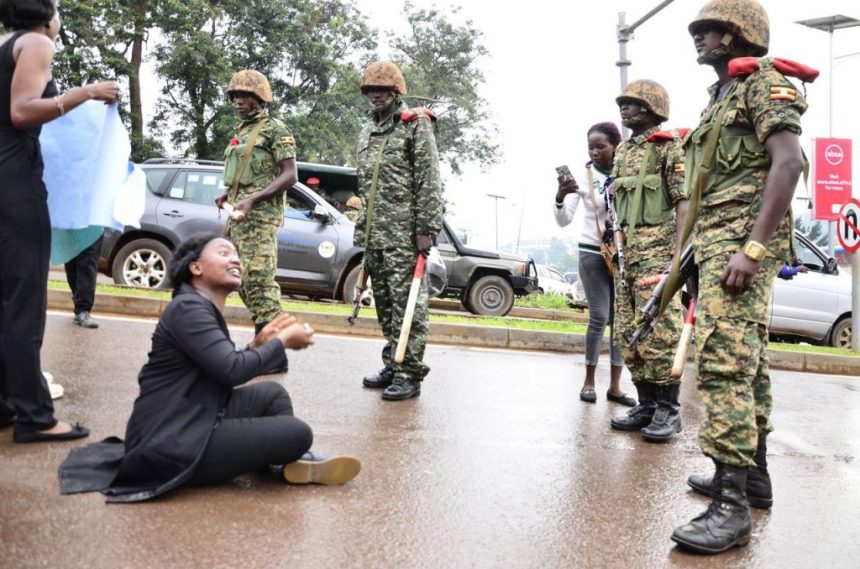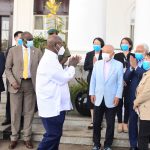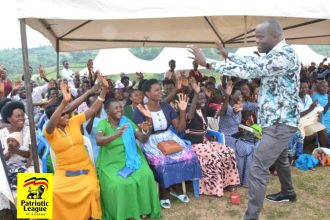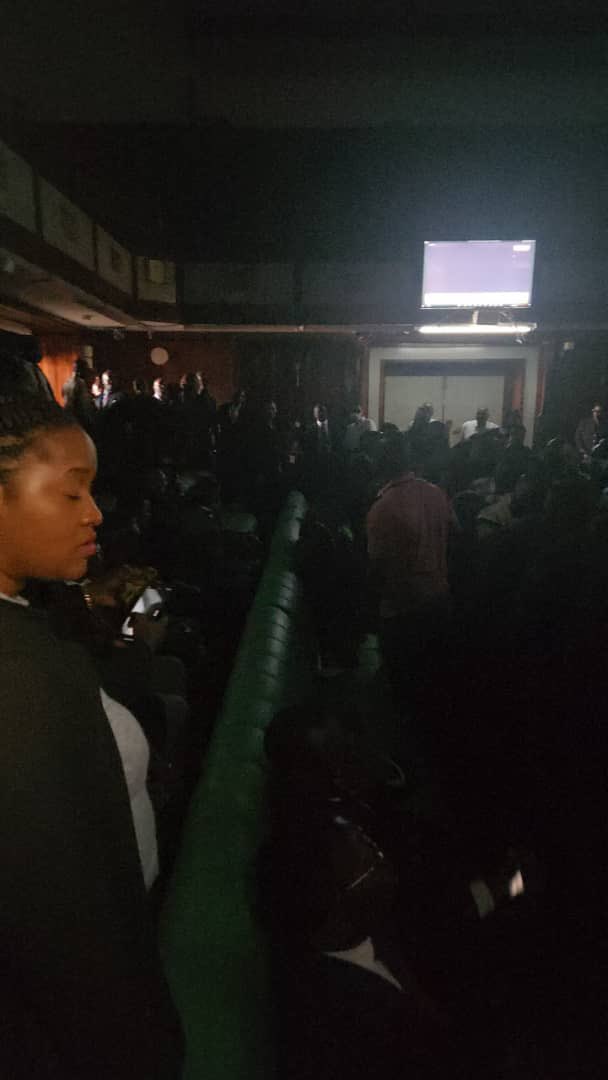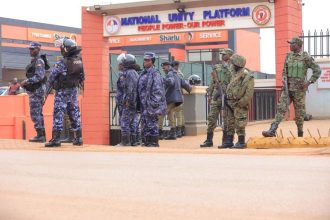Charles Onyango-Obbo, the famed journalist, writer, and curator of THE WALL OF GREAT AFRICANS (WoGA), recently took a nostalgic trip down memory lane, comparing the good old days with today’s reality. As the grandchild (muzzukulu) of Thomas Onyango, a musician and chief, Onyango-Obbo reflected on the stark contrast between his grandfather’s era and the current times.
“My grandfather Thomas Onyango was a man of principles, a musician, and a chief,” begins Onyango-Obbo. “He was a staunch believer in the 10 Commandments, particularly the one about not stealing. He was always reminding us to reject thieves. He loved his grandchildren and would often sneak us a taste of mwenge when the grandmothers weren’t looking. He told us great stories and rewarded honesty. That’s what grandparents did with their bazukkulu.”
Now, pause for a moment and imagine today’s grandfathers, complete with tear gas canisters and riot gear, chasing their grandchildren around like they’re on some twisted version of the village sports day. “Did our grandparents get it wrong, or have the times changed?” mused Onyango-Obbo, his words dripping with irony.
Growing up in Uganda, where the values of honesty, respect, and community were instilled by elders, Onyango-Obbo’s reminiscences are a bittersweet reminder of how much things have shifted. Picture it: back in the day, the only fear we had was of being caught stealing a mango from the neighbor’s tree. Today, kids are dodging tear gas like they’re extras in a bad action movie.
Thomas Onyango’s legacy was one of love and integrity. He was the type of grandparent who would gather the children around the fire, tell them stories of old, and share his wisdom. Today, it seems like those stories have been replaced with headlines of political drama and unrest.
Let’s break it down in a table for the visual learners among us:
| Then (Grandfather’s Era) | Now (Current Era) |
|---|---|
| Emphasized the 10 Commandments | Emphasized the 10-point Riot Control Plan |
| Sneaked mwenge to grandchildren | Sneaks tear gas to dispersers |
| Rewarded honesty | Rewards silence |
| Gathered grandchildren for storytelling | Gathers grandchildren for arrest records |
Onyango-Obbo’s satirical take on the situation is not just about nostalgia; it’s a commentary on how values and societal norms have evolved. “Back then, if you had a disagreement, you settled it with a dance-off or a wrestling match, not with teargas and rubber bullets,” he quips. Imagine your Jjajja (grandfather) saying, “Today’s lesson, my dear muzzukulu, is how to protest without getting arrested. Step one: run faster than a cheetah.”
Reflecting on his own childhood, Onyango-Obbo remembers the stories his grandfather told. They were tales of bravery, integrity, and wisdom, aimed at teaching life lessons. “These days, what stories will our grandchildren hear? The one about how Jjajja outran the police, or how he hacked the government website?” he asks, his tone laced with sarcasm.
The times have indeed changed, and not necessarily for the better. Onyango-Obbo’s reflections serve as a poignant reminder of the values that once held society together. As he so aptly puts it, “Did our grandparents get it wrong, or have the times changed?”
President Yoweri Museveni’s recent address to the nation on the thwarted anti-corruption protests revealed more than just a government’s concern for peace and order. It exposed a disturbing reality of a regime that consistently suppresses dissent under the guise of national security and foreign interference. In his speech, Museveni congratulated the Armed Forces, Security Forces, and the citizens for preventing what he described as a “bad demonstration” planned for Tuesday. He attributed the protest to two main elements: foreign funding and malicious intentions against the Ugandan people.
Equating the protesters’ actions to these foreign influence is a significant stretch. The people who took to the streets were not foreign agents but Ugandans exercising their constitutional right to peaceful assembly.
Museveni’s assertion that the protest was backed by foreign funds is reminiscent of the days when colonial powers used divide-and-rule tactics to suppress indigenous resistance. It seems Museveni is reviving this narrative to delegitimize genuine grievances against his government. The president’s claim that some protestors planned “very bad things” is vague and unsubstantiated, leaving room for speculation and fearmongering. He assures that these plans will be revealed in court, but given the government’s history of controlling the judiciary, can Ugandans trust that justice will be served?
Uganda’s history is replete with leaders who have suppressed dissent in the name of maintaining order. During the reign of Idi Amin, the slightest opposition was met with brutal force. Similarly, Museveni’s regime has consistently used the police and military to quash protests. The president’s suggestion that he would have joined the demonstration if it had been patriotic and anti-corruption is hypocritical. His administration has repeatedly shown that it does not tolerate any form of dissent, regardless of the cause.
Museveni’s reference to “idle and disorderly” charges against protestors harks back to colonial-era laws used to suppress resistance against the British. These laws have no place in a modern democracy, yet they are still being used to stifle voices calling for accountability. The president’s statement that the operation was intelligence-led and that he possesses most of the information only underscores the state’s surveillance and control over its citizens.
The president’s promise to fight corruption sounds hollow given his government’s track record. Corruption in Uganda is deeply entrenched, with high-ranking officials frequently implicated in scandals. Museveni’s assurance that he needs evidence to act against corruption is laughable. The evidence is abundant, but the will to act on it is conspicuously absent. The president’s declaration that he is leading a “little war” against corruption is reminiscent of his days as a guerrilla fighter. However, the real war that needs fighting is against the systemic corruption that has plagued his administration for decades.
Museveni’s speech is a stark reminder of the government’s persistent crackdown on civil liberties. The president’s rhetoric of foreign interference and vague threats only serve to distract from the genuine issues facing Uganda. The people of Uganda deserve better than a government that uses fear and repression to maintain its grip on power.
Table: Key Points from Museveni’s Address
| Topic | Museveni’s Claim | Critique |
|---|---|---|
| Protest Funding | Foreign sources meddling in Uganda’s affairs | Historical scapegoating to delegitimize genuine grievances |
| Protest Intentions | Participants planned “very bad things” | Vague and unsubstantiated claims to instill fear |
| Police Advice | Protestors ignored police advice | Government uses police to suppress peaceful assembly |
| Patriotic Demonstration | Museveni would join a peaceful anti-corruption protest | Hypocrisy given the government’s track record of quashing dissent |
| Idle and Disorderly Charges | Charges used due to lack of complete information | Reminiscent of colonial-era laws used to suppress resistance |
| Corruption Fight | Museveni claims to lead the fight against corruption | Hollow promise given the government’s entrenched corruption |

